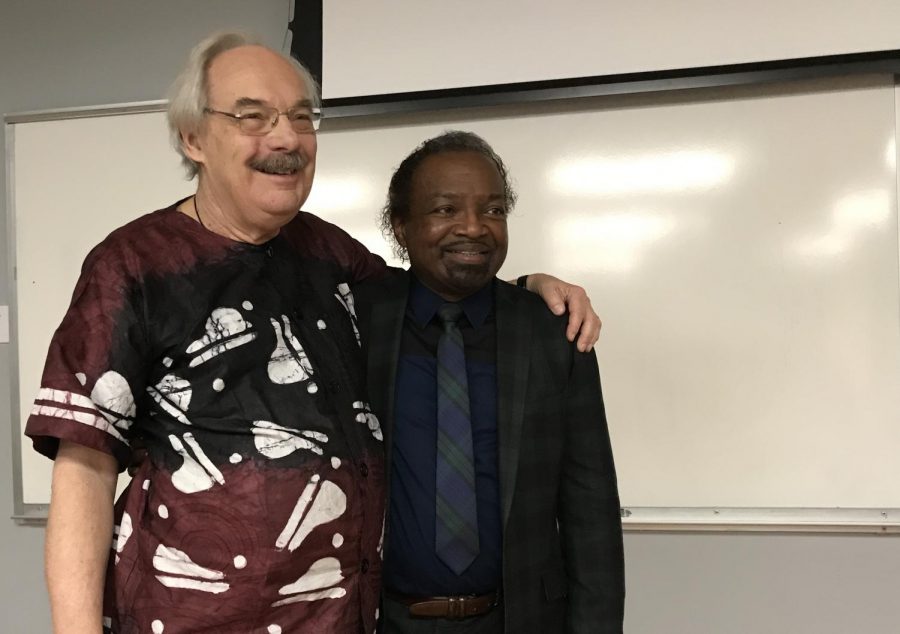Guest lecturer speaks on hidden truths of slavery
Jack Kessler
Dr. Paul E. Lovejoy (left) and Dr. Booksie S. Harrington (right) — both members of the Harriet Tubman Institute at York University — embrace each other onstage after Lovejoy’s presentation “Slavery in the Global Diaspora of Africa” the evening of March 5 at UNCW’s Randall Library.
The unspoken truths of slavery — African complicity, its place in the creation of the modern world and the personal stories of those enslaved — must be brought to light, said the founding director of The Harriet Tubman Institute for Research on Africa and its Diasporas at UNC Wilmington’s Randall Library on March 5.
“It was hard to really say to people ‘blacks enslaved blacks,’ when it was at a time when people were trying to forget that whites enslaved blacks. That’s where I began,” said Dr. Paul E. Lovejoy.
Lovejoy’s presentation, “Slavery in the Global Diaspora of Africa,” hosted by the UNCW department of history, focused on Lovejoy’s book of the same name, as well as his research into and efforts to expose the lesser-known aspects of the slave trade in the Americas, Europe and Africa itself.
“I am teaching a course on the revival of slavery from 1914 to 1945, so this is very relevant for myself and my students, it would seem to me,” said Dr. Michael Seidman, a professor of modern European history at UNCW.
The fact that African states and leaders were complicit — both in shipping slaves across the Atlantic Ocean and exploiting slave labor at home — is a fact that is often swept under the rug, said Lovejoy.
“These were leaders who had been educated in Europe, they knew what they were doing,” he said.
Africa’s role in the wider world during the early 1800s, not just as a major source of slaves but as a center of industry and civilization, connected to the rest of the globe is also understated, said Lovejoy.
As an example of Africa’s forgotten contribution to the world, Lovejoy pointed to the city of Kono, which during its heyday was a major center of the textile industry. With factories producing clothes and fabrics rivaling those of Great Britain and India, Kono clothed most of western Africa. Lovejoy estimates, however, that Kono’s population was also at least half enslaved — a necessary prerequisite for its success.
In an effort to combat what he sees as the public’s ignorance about slavery, Lovejoy began “Freedom Narratives,” a project which has documented over 2000 testimonies from enslaved West Africans. Those men and women the project documents — such as Ali Eisami, Catherine Mulgrave Zimmerman and Nicholas Said — deserve to be honored as national heroes, said Lovejoy.
“I thought it was a really, really well-done lecture,” said UNCW freshman Malin Heppert. “I learned a lot about not just the diaspora of the slave trade but just the civilization of Africa, how it affected other countries, and I also really enjoyed learning about the biographies of certain Western Africans.”








